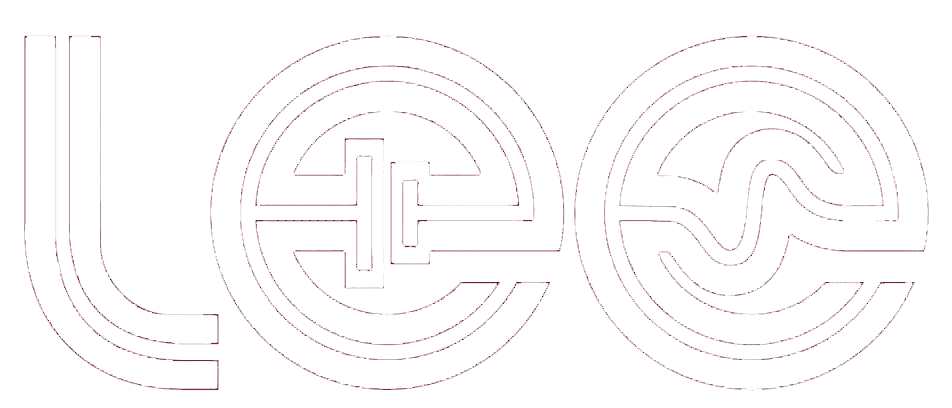LEE conducts Energy-X Summer School 2022
July 1, 2022
The Laboratory of Electrochemical Engineering, through its CIPHER* project, conducted the 𝗘𝗻𝗲𝗿𝗴𝘆-𝗫 𝗦𝘂𝗺𝗺𝗲𝗿 𝗦𝗰𝗵𝗼𝗼𝗹 𝟮𝟬𝟮𝟮 from May 07 to 𝗝𝘂𝗻𝗲 30, 𝟮𝟬𝟮𝟮. 𝗘𝗻𝗲𝗿𝗴𝘆-𝗫 𝗦𝘂𝗺𝗺𝗲𝗿 𝗦𝗰𝗵𝗼𝗼𝗹 𝟮𝟬𝟮𝟮 is an online course on 𝗗𝗲𝗻𝘀𝗶𝘁𝘆 𝗙𝘂𝗻𝗰𝘁𝗶𝗼𝗻𝗮𝗹 𝗧𝗵𝗲𝗼𝗿𝘆 (𝗗𝗙𝗧) 𝗮𝗻𝗱 𝗶𝘁𝘀 𝗔𝗽𝗽𝗹𝗶𝗰𝗮𝘁𝗶𝗼𝗻𝘀 𝗼𝗻 𝗘𝗻𝗲𝗿𝗴𝘆 𝗦𝘁𝗼𝗿𝗮𝗴𝗲 𝗧𝗲𝗰𝗵𝗻𝗼𝗹𝗼𝗴𝗶𝗲𝘀, which intends to expand the skill set of its participants towards computational materials research. It aims to introduce young professionals to Density Functional Theory (DFT), DFT-based calculations, and its applications on energy storage research. This summer school also served as an avenue of training for CIPHER researchers.
For every Saturday, 𝗣𝗿𝗼𝗳. 𝗔𝗹𝗹𝗮𝗻 𝗔𝗯𝗿𝗮𝗵𝗮𝗺 𝗕. 𝗣𝗮𝗱𝗮𝗺𝗮 of the Institute of Mathematical Sciences and Physics, University of the Philippines Los Baños provided seven lectures on the theoretical background and applications of DFT. The participants were also engaged in hands-on workshops through Zoom to familiarize themselves with DFT calculations. To conclude the course, a mini-symposium was held where experts from international universities – Prof. Jan Rossmeisl, Asst. Prof. Koji Shimizu, and Prof. Yoshitada Morikawa – presented their research on the application of DFT to energy storage technologies. Student presenters also shared their current progress in their DFT research projects.
Overall, the summer school catered to more than 20 students across 11 universities, and the mini-symposium catered to over 150 undergraduate and graduate students. LEE is grateful for the high turnout, and is looking forward to hosting Energy-X Summer School 2023 on another field in electrochemistry.
*The 𝗖𝗹𝗲𝗮𝗻 𝗮𝗻𝗱 𝗩𝗲𝗿𝘁𝗶𝗰𝗮𝗹𝗹𝘆-𝗜𝗻𝘁𝗲𝗴𝗿𝗮𝘁𝗲𝗱 𝗣𝘂𝗿𝗲/𝗔𝗽𝗽𝗹𝗶𝗲𝗱 𝗛𝘆𝗱𝗿𝗼𝗴𝗲𝗻 𝗘𝗻𝗲𝗿𝗴𝘆 𝗥𝗲𝘀𝗲𝗮𝗿𝗰𝗵 𝗳𝗼𝗿 𝗡𝗲𝘅𝘁 𝗚𝗲𝗻𝗲𝗿𝗮𝘁𝗶𝗼𝗻 𝗣𝗼𝘄𝗲𝗿 𝗦𝘆𝘀𝘁𝗲𝗺𝘀 (𝗖𝗜𝗣𝗛𝗘𝗥) is a two-year project that aims to develop energy storage technologies by addressing key areas in energy research, combining computational and experimental approaches to help the Philippines transition into a cleaner and sustainable energy system. It is funded by the Commission on Higher Education - Philippine-California Advanced Research Institutes under the Cycle 6 grants (IIID 2018-008).08).

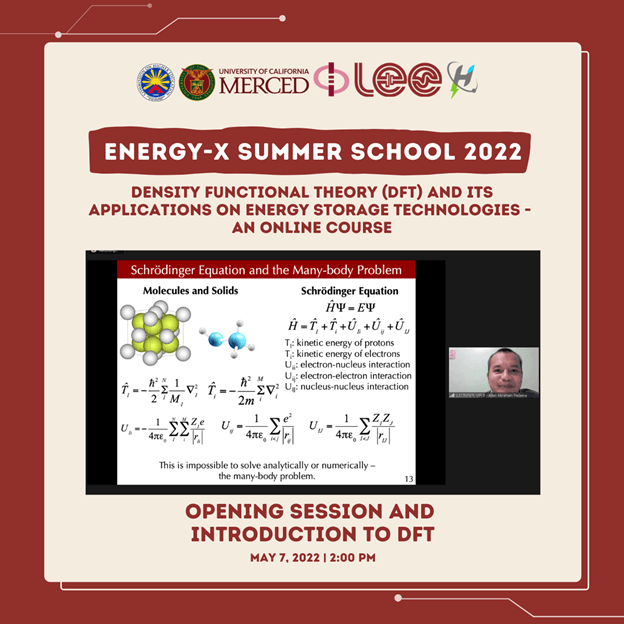
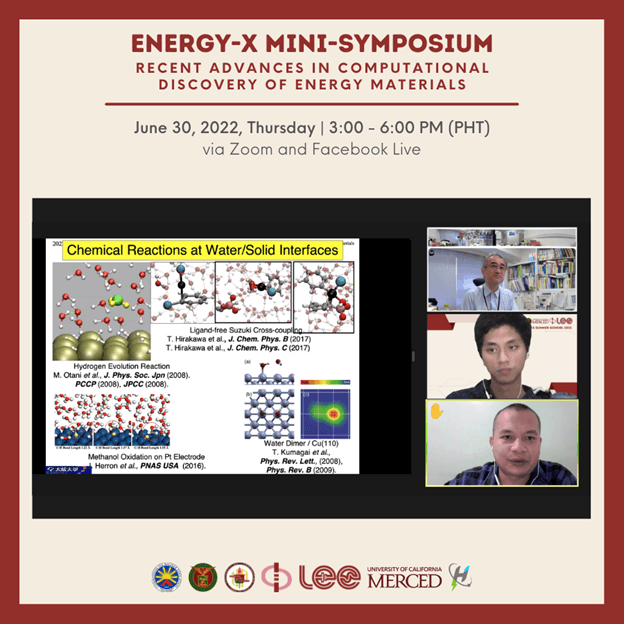
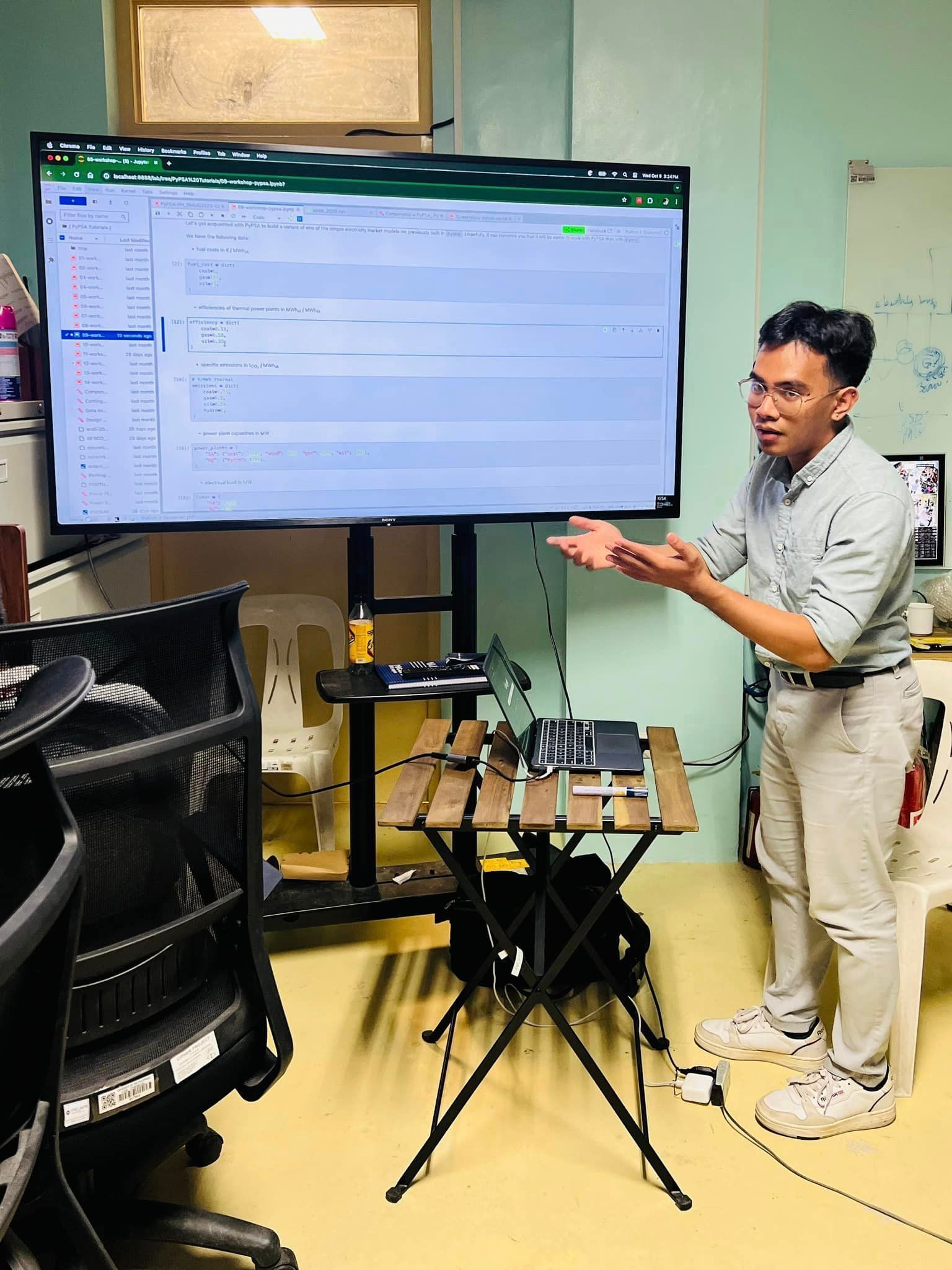
LEE research staff and graduate students participated in an in-house training and workshop on the Python for Power Systems Analysis (PyPSA) toolbox on October 9 and 23, 2024 . The sessions were led by Arizeo Salac (SRS 1, ElectriPHI), who returned from a six-month research sandwich program at the Reiner Lemoine Institute in Berlin, Germany , where he focused on data-driven decision-making and energy systems modeling. The training included a detailed discussion on energy systems modeling, with key topics such as data sources and the representation of energy systems using both conventional and renewable technologies. Participants received hands-on assistance with the software setup and installation, followed by simulation activities that showcased PyPSA’s capabilities in energy and power systems analysis. Mr. Salac also presented his baseline model of the Philippine energy system, which can be utilized for energy transition scenario planning. The event aimed to enhance participants' proficiency with open-source modeling tools, share best practices in modeling, and support their research in energy systems. Article by: Sophia Lunor
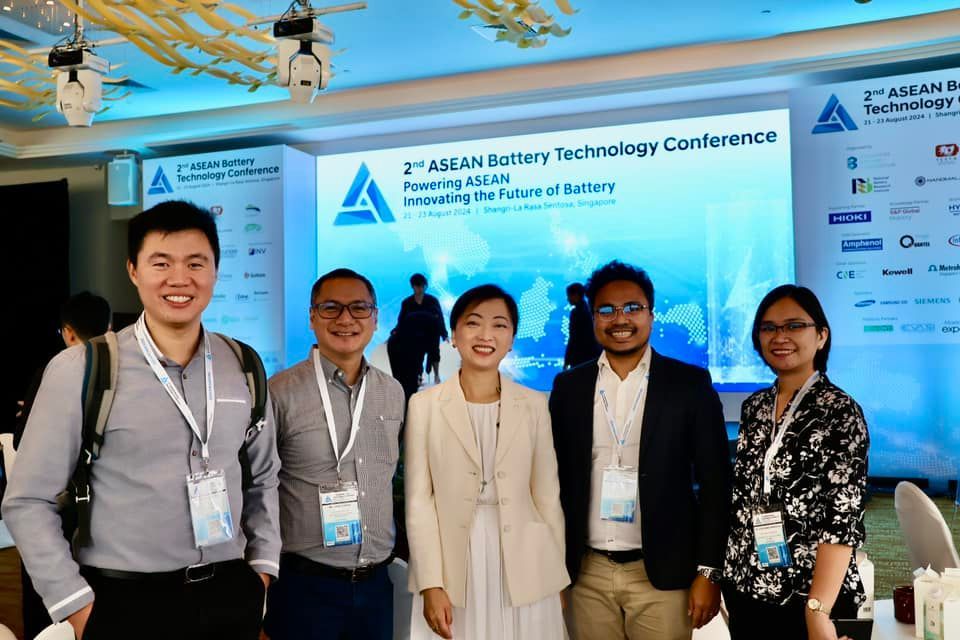
Prof. Joey D. Ocon, Dr. Julie Anne D.R. Paraggua, Dr. Lawrence Limjuco, and Giancarlo Sanglay were among the Filipino delegates at the 2nd ASEAN Battery Technology Conference , held from August 21 to 23, 2024 , at the Shangri-La Rasa Sentosa in Singapore. Themed "Powering ASEAN: Innovating the Future of Battery," the event was co-organized by key ASEAN associations from Singapore, Thailand, Indonesia, Malaysia, and the Philippines. They were accompanied by LEE member and graduate student, Giancarlo Sanglay and NextGen Project Chief Technical Specialist, Dr. Lawrence Limjuco, of the Advanced Batteries Center. The conference aimed to foster connections among researchers, engineers, and industry stakeholders within the battery and electric vehicle (EV) sectors. It provided a platform for knowledge exchange, technical discussions, and potential collaborations. Key topics included the development of the Battery and EV Roadmap for Southeast Asia, as well as government policies and regulations surrounding battery and energy storage systems (ESS) applications. Industry leaders and academic experts also addressed technological advancements in battery materials, financial support for innovations, and strategies for managing the end-of-life value chain of batteries. Prof. Ocon, who also serves as Co-Founder of Nascent Batteries, played an active role in the event by moderating a panel discussion on advancing ESS technologies in Asia. The panel featured representatives from prominent organizations, including EDP Renewables APAC, Green Tenaga Pte Ltd, and the Electricity Generating Authority of Thailand. This collaborative event underscored the region's commitment to advancing sustainable energy solutions and highlighted the critical role of ASEAN countries in driving innovation within the battery and EV industries. Article by: Lora Monique Sapanta
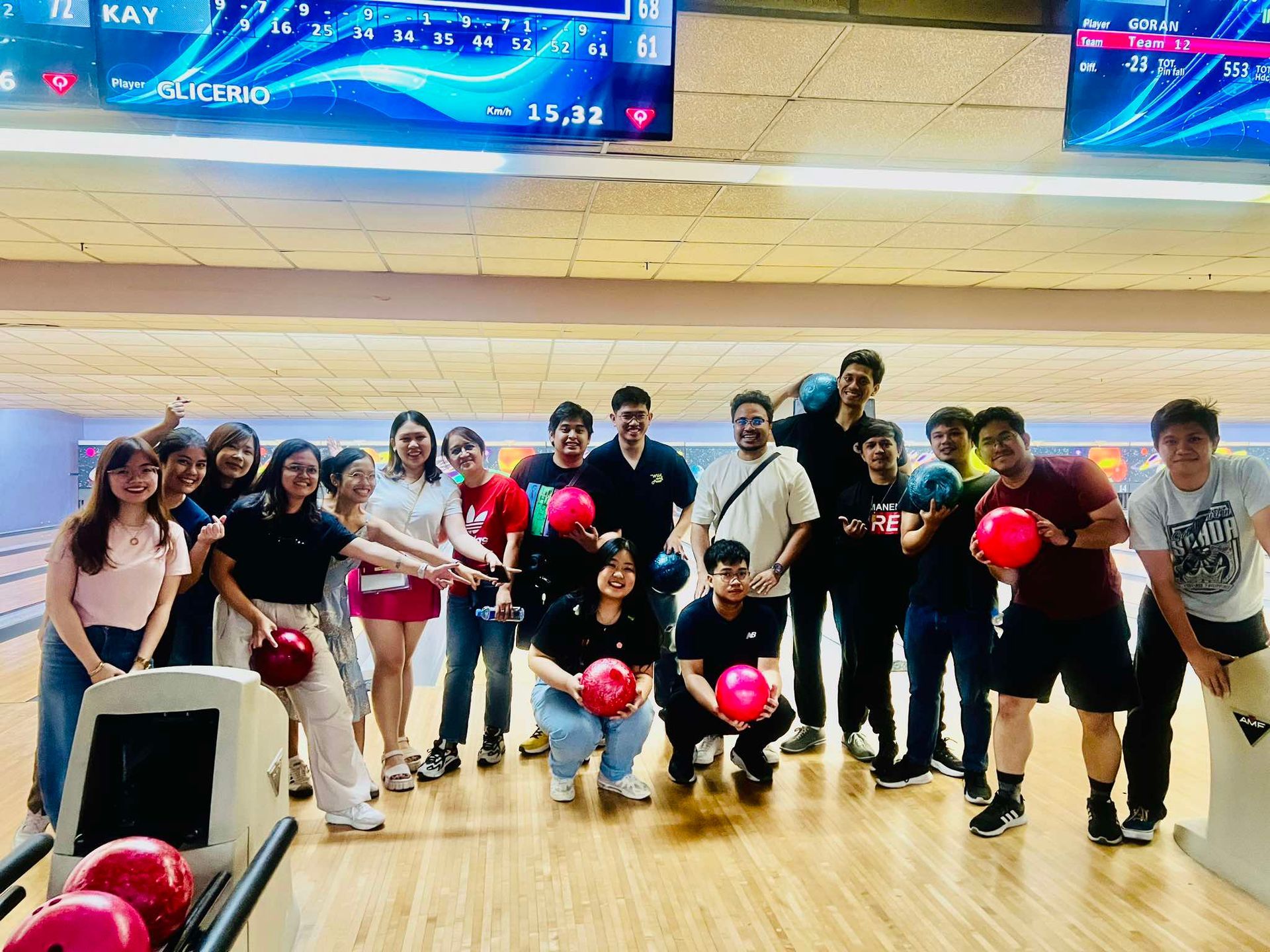
The Laboratory of Electrochemical Engineering (LEE) held a despedida party to bid farewell to two of its active members — Ms. Rosela Lazaro and Asst. Prof. Michael Castro — as they embark on a new chapter of their academic journey. The LEE members, along with their laboratory head, Prof. Joey D. Ocon, celebrated through a friendly competition at the Ever Gotesco Bowling Alley, Commonwealth Avenue last August 19, 2024. This also fostered camaraderie and strengthened the bond and friendship between the lab members. Ms. Lazaro will be studying MS in Environmental Science and Engineering at Gwangju Institute of Science and Technology, South Korea. Meanwhile, Asst. Prof. Castro will be pursuing a doctorate degree in Nuclear Engineering and Management at the University of Tokyo, Japan. He will be returning to UP Diliman to tend to his duties at the Department of Chemical Engineering. Indeed, ‘goodbyes’ are not the end. It marks a beginning of a new ‘hello’, a step closer to making dreams come true. To Sir Michael, ganbatte! To Sela, hwaiting! We are all rooting for you both! Article by: Lora Monique Sapanta


